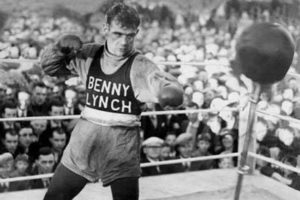Benny Lynch: A Look Back at One of The Greatest Boxers In the History of the Sport of Boxing
 By Donald “Braveheart” Stewart
By Donald “Braveheart” Stewart
I have a very eclectic taste in all things and now and again the matters about which I write come together in a delicious moment of having two indulgences clashing to offer me an evening that would double my joy. It was therefore with that inimitable joy that I got an email that told me all about “Lynched” a new play about the iconic Scottish boxer, Benny Lynch.
Ranked in the top 80 boxers of all time – number 63 – by BoxRec – this is a man who epitomizes the Scottish character as well as the punching above our weight mentality that my small yet not insignificant country typifies. Remember that Scotland gave you a phone, a TV, tarmac and the game of golf – I would like to apologize for the latter.
As a clichéd nation we get epitomised as drunkards who fight at the drop of a hat; welcome to Benny Lynch.
A flyweight, born just before the beginning of the First World War in 1913 his life was cut off within one year of the end of the Second World War when he was just 33 years old. His abilities went beyond the nation he represented and, as well as the BoxRec accolade, it should be noted that he ranks in the top 5 of flyweight of all time according to Ring Magazine founder, Nat Fleischer and the International Boxing Research Organization. Praise indeed and it comes from people who ought to know.
In 1986 he was elected to the Ring’s Hall of Fame before his induction into the International Boxing Hall of Fame in 1998.
Plaudits aside, this was an ordinary man, born in the slums of an infamous part of Glasgow – the Gorbals. In his early life, Lynch went to the visiting carnivals that toured the West Coast of Scotland and plied his trade in their booths.
He was fighting for poor money in the context of the Great Depression and under the shadow of the rise of Fascism in Europe. Lynch was a chink of beautiful light as the clouds of war gathered for the people who began to whisper of his prowess. In 1934 – the 16th May – he took the Scottish flyweight title in Glasgow. The following year he was in Manchester, up against Jackie Brown for the British, European AND world flyweight titles. At a time when the winning of titles was that bit more special – because there were so few – imagine the anticipation and the nervousness that he must have felt. Glasgow almost emptied as they travelled to Manchester to support their hero.
Scheduled for the usual 15 rounds, Lynch dropped Brown no fewer than 15 times before the fight was stopped in the SECOND round!
It would not be boxing if there was not, however, discussion, argument and even fights over who was REALLY the best flyweight in the world. In Scotland we knew but in the Americas they demurred; the Filipino Small Montano was their champion. In 1936, Lynch returned to England, this time to London, to take on Montana. Once again the Scots had a cause and marched alongside it. What they saw was a massively important win for Lynch on points; an argument had been settled, Lynch was to be lauded. It was now that he was at the pinnacle of his powers.
Of course, Lynch was not undefeated and between the years 1932 and 1936 he lost no fewer than 5 times. Of course this was a time when losing was not seen as a disaster and I am sure that the word journeyman had not entered any dictionary.
Being Scots, of course, in 1937 when he knocked down the undefeated Englishman Peter Kane by knocking him out, he moved higher in our estimations. For us, beating the English was almost as important as beating the Rest of the World!
In 1938, with the war looming large, Lynch lost his world flyweight title on the scales. He was unable to make the weight against Jackie Jurich of the USA. With the belt gone, Lynch stopped Jurich in the 12th round.
The problem with making weight was simply as a result of a man who was now in the firm grip of his alcoholism.
1939 and the British Boxing Board of Control’s removal of his licence due to him not passing their fitness test sounds as tragic as it could be. Only 7 years later this Titan of Scottish sport died. Of what?
It was not of dementia due to his sport or the long term effects of boxing at a high level at a time when medicine was not as advanced as now in treating sporting injuries. The greatest boxer in Scotland’s history died of malnutrition and respiratory failure.
Over 2,000 people came out at his funeral to see him laid to rest in Glasgow. It was a peaceful rest after a hectic life. His inability to find a means through which he could control his alcoholism led to a final chapter that was as dreadful as it was and is clichéd in Scotland; we still struggle with drink. In that illustrious career he fought in soccer stadia including St Mirren’s ground, Liverpool’s Celtic’s and at the Empire Pool in London as well as King’s Hall Belfast. His was a popular reign and a career that was undeniably meteoric. But the higher he flew, the harder the thump came when it all ended. By the time he died, his legacy was tarnished. In death though he became restored as we celebrated a life that was all around us in the slums of Glasgow. That he flew high enough to be most talked about sportsman of the 1930’s was his pride. That he was Scottish, is ours.
[si-contact-form form=’2′]

